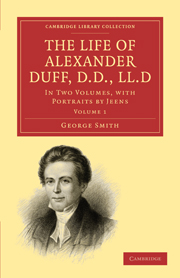Book contents
- Frontmatter
- Contents
- CHAPTER I THE BOY AND THE STUDENT
- CHAPTER II THE FIRST MISSIONARY OF THE CHURCH OF SCOTLAND
- CHAPTER III THE TWO SHIPWRECKS
- CHAPTER IV CALCUTTA AS IT WAS
- CHAPTER V THE MINE PREPARED
- CHAPTER VI THE FIRST EXPLOSION AND THE FOUR CONVERTS
- CHAPTER VII THE RENAISSANCE IN INDIA — THE ENGLISH LANGUAGE AND THE CHURCH
- CHAPTER VIII THE RENAISSANCE IN INDIA—SCIENCE AND LETTERS
- CHAPTER IX WORK FOR EUROPEANS, EURASIANS AND NATIVE CHRISTIANS
- CHAPTER X THE INVALID AND THE ORATOR
- CHAPTER XI DR. DUFF ORGANIZING
- CHAPTER XII FISHERS OF MEN
- CHAPTER XIII EGYPT—SINAI—BOMBAY—MADRAS
- CHAPTER XIV FIGHTING THE GOVERNOR-GENERAL
- CHAPTER XV THE COLLEGE AND ITS SPIRITUAL FRUIT
CHAPTER II - THE FIRST MISSIONARY OF THE CHURCH OF SCOTLAND
Published online by Cambridge University Press: 05 July 2011
- Frontmatter
- Contents
- CHAPTER I THE BOY AND THE STUDENT
- CHAPTER II THE FIRST MISSIONARY OF THE CHURCH OF SCOTLAND
- CHAPTER III THE TWO SHIPWRECKS
- CHAPTER IV CALCUTTA AS IT WAS
- CHAPTER V THE MINE PREPARED
- CHAPTER VI THE FIRST EXPLOSION AND THE FOUR CONVERTS
- CHAPTER VII THE RENAISSANCE IN INDIA — THE ENGLISH LANGUAGE AND THE CHURCH
- CHAPTER VIII THE RENAISSANCE IN INDIA—SCIENCE AND LETTERS
- CHAPTER IX WORK FOR EUROPEANS, EURASIANS AND NATIVE CHRISTIANS
- CHAPTER X THE INVALID AND THE ORATOR
- CHAPTER XI DR. DUFF ORGANIZING
- CHAPTER XII FISHERS OF MEN
- CHAPTER XIII EGYPT—SINAI—BOMBAY—MADRAS
- CHAPTER XIV FIGHTING THE GOVERNOR-GENERAL
- CHAPTER XV THE COLLEGE AND ITS SPIRITUAL FRUIT
Summary
The work had been waiting for two hundred and seventy years. Alone of all the Reformed Churches the Kirk of Scotland had placed in the very front of its Confession the fact that it was a missionary church. The foresight of John Knox, the statesmanship of the Scotsmen who gave civil as well as religious freedom to the kingdom, have been extolled by secular historians so opposite as Mr. Froude and Mr. Hill Burton. But that foresight saw farther than even they acknowledge, when the Scottish Parliament of 1560 passed an Act embodying the first Confession, which has this for its motto, “And this glaid tydingis of the kyngdome sall be precheit through the haill warld for a witnes unto all natiouns, and then sail the end cum.” That confession was the four days' work of John Winram, John Spotswood, John Willock, John Douglas, John Row and John Knox.
First self-preservation, then the attempt to throw their own ecclesiastical organization uniformly over England also by political means, and finally the reaction and the indifference which mere policy brings about, succeeded in reducing the Kirk of the eighteenth century to lifelessness. What had, for all Christendom, been a series of crusades against the Turks; and for the Spanish and Portuguese discoverers in the Indies, West and East, a series of raids by the Latin Church on the native inhabitants, became in the Reformed Churches at home a defence of the orthodox faith against popery.
- Type
- Chapter
- Information
- The Life of Alexander Duff, D.D., LL.DIn Two Volumes, with Portraits by Jeens, pp. 33 - 64Publisher: Cambridge University PressPrint publication year: 2010First published in: 1879



